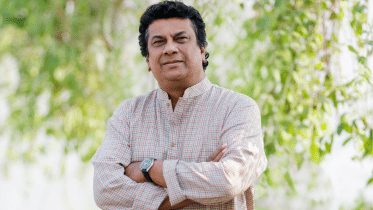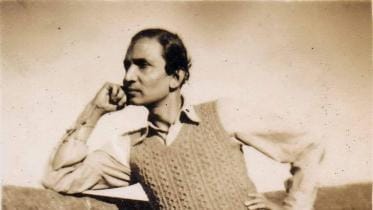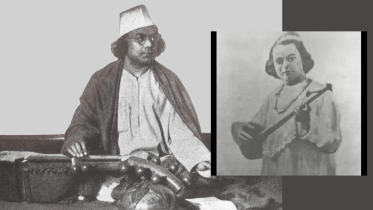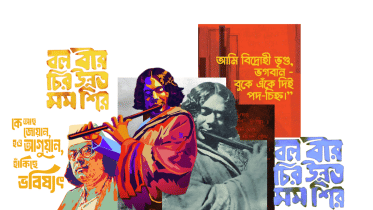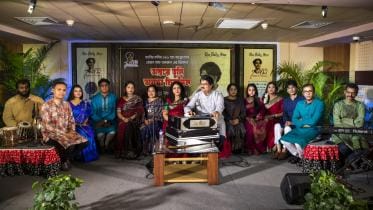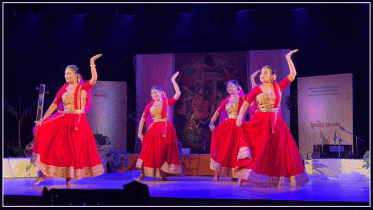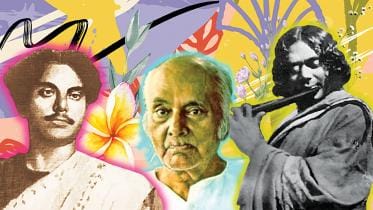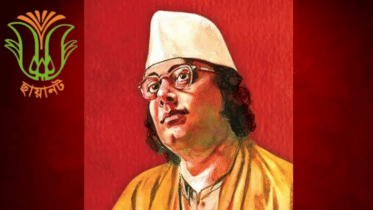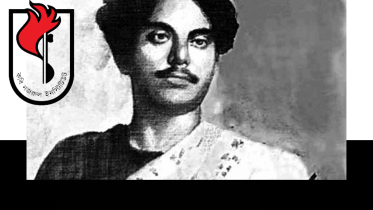Kazi Nazrul Islam
A nation without culture cannot truly progress: Khairul Anam Shakil
For Khairul Anam Shakil, celebrating five decades of music is not just a personal milestone; it is a reflection of Bangladesh’s cultural heartbeat. As a celebrated Nazrul Sangeet exponent and General Secretary of the Bangladesh Nazrul Sangeet Sangstha (BNSS), Shakil has devoted his life to teaching, performing, and preserving the legacy of Kazi Nazrul Islam.
13 December 2025, 03:00 AM
The dawn of Islamic songs in Bengal
Though Muslims of undivided Bengal used to view music and dance as Hindu traditions and distanced themselves from them, they warmly embraced Abbasuddin's Islamic songs written by Kazi Nazrul Islam.
26 October 2025, 18:00 PM
Forbidden Nazrul
Both Bengals are grappling with intense periods of unrest. While the political events unfolding in these two lands may not align directly, they share one significant commonality: distrust.
31 August 2025, 18:00 PM
Negative of Kazi Nazrul Islam’s film 'Dhruva' destroyed, says Kolkata’s NT1 Studio
Made 91 years ago, “Dhruva” (1934) is the sole film Kazi Nazrul Islam directed—co-helmed with Satyendranath Dey—and is widely noted in Bengali cinema history for placing the national poet behind the camera as both director and actor.
31 August 2025, 06:54 AM
Musical film ‘Shanjher Anchole’ pays tribute to Kazi Nazrul Islam
In commemoration of the 49th death anniversary of the legendary rebellious poet Kazi Nazrul Islam, filmmaker Chayanika Chowdhury shared details about her musical film “Shanjher Anchole”.
27 August 2025, 13:00 PM
Like an undying phoenix, the spirit of Nazrul lives on
That night in December 1921, while his comrade Muzaffar Ahmed slept, Nazrul scribbled furiously. By the morning, the air was charged with something new. “Bolo Bir, Chiro Unnoto Momo Sheer…” (“I am the Rebel Eternal, / I raise my head beyond this world, / High, ever erect and alone!”) he declared. It was not merely the birth of a poem but of a cultural rupture. Critics would later see in “Bidrohi” a break from the ‘Rabindric’ serenity that had long defined Bengal’s literary landscape—a new current of words forged in fire, laced with the clang of rebellion.
26 August 2025, 18:05 PM
Telefilm inspired by Nazrul’s music to air on Channel i
A new telefilm titled “Priyo Emon Raat”, inspired by a timeless song of the National Poet Kazi Nazrul Islam, is set to premiere on Channel i. The production draws from Nazrul’s much-loved romantic song “Priyo Emon Raat Jeno Jai Na Britha”, which continues to resonate with audiences across generations.
26 August 2025, 08:04 AM
Ruins that whisper love and legacy
At first glance, a sigh escapes almost involuntarily.
18 July 2025, 19:42 PM
‘Nazrul Rock Concert’ debuts with reimagined rebel songs
The first “Nazrul Rock Concert 2025” took place last evening, marking the launch of a new album by the Nazrul Institute. As part of this initiative, the institute has released 10 songs of rebellion and awakening by National Poet Kazi Nazrul Islam, reimagined and performed by 10 different Bangladeshi bands.
1 June 2025, 13:43 PM
‘Ontorey Tumi Acho Chirodin’: A tribute to Nazrul’s enduring musical legacy
To commemorate the 126th birth anniversary of Kazi Nazrul Islam, the National Poet of Bangladesh, the cultural platform Gems of Nazrul hosted a musical tribute titled “Ontorey Tumi Acho Chirodin” this evening. The event brought together prominent Nazrul exponents and emerging voices to celebrate the poet’s diverse musical repertoire and reflect on his unparalleled contributions to Bengali music.
31 May 2025, 16:27 PM
Nazrul’s legacy honoured with ‘Thumri’r Jalsa’ concert at Chhayanaut
Departing from the usual commemorative fare of patriotic or devotional pieces, the concert spotlighted Nazrul’s lesser-explored work in the thumri genre, revealing his artistic range as a composer unafraid to traverse genres and expand musical language. Both celebrated vocalists and promising young talents took the stage, honouring the legacy while pushing it forward.
25 May 2025, 05:14 AM
Celebrating the Rebel Bard: A Nationwide tribute to Kazi Nazrul Islam
Today marks the 126th birth anniversary of Kazi Nazrul Islam, the national poet of Bangladesh. A powerful force in Bengali literature and culture, Nazrul's fiery words, revolutionary spirit, and undying call for equality continue to resonate in the hearts of millions. In honour of his life and legacy, a vibrant array of nationwide events and television programmes has been organised, celebrating Nazrul’s timeless contribution.
25 May 2025, 03:00 AM
Embracing the chaos: The art of creation
Creative blocks mirror nature’s barren phases, yet chaos and stillness birth inspiration. True creativity resists control, flowing from instinct and emotion. In its wild, sacred moments, we connect deeply—with self, soul, and the art of becoming.
24 May 2025, 10:47 AM
Three Songs: Kazi Nazrul Islam
The mind craves to fly far away. / In the guise of a beggar, eyes wet with tears
23 May 2025, 18:14 PM
Four artistes join forces for Nazrul Jayanti tribute album
In tribute to National Poet Kazi Nazrul Islam’s birth anniversary, a new album titled “The Nazrul Tapes—Reflected by Jahid Nirob” reimagines four of his classic songs. Musician Jahid Nirob has infused the timeless compositions with modern arrangements, blending electronic elements to reinterpret Nazrul’s works through a contemporary lens.
21 May 2025, 06:20 AM
Nazrul Utsav will inaugurate at Chhayanaut tomorrow
Notable Indian artistes participating in this event include Shreeradha Bandyopadhyay, Manomay Bhattacharya, Pandit Tushar Dutta, Brajeswar Mukherjee, and Payel Kar. Among the distinguished Bangladeshi artistes lending their voices to this initiative are Yakub Ali Khan, Khairul Anam Shakil, Ferdous Ara, Nashid Kamal, and Yasmin Mushtari.
23 February 2025, 13:17 PM
Ministry-backed rock album to feature 20 bands celebrating Nazrul
The album is being produced under the supervision of the Kabi Nazrul Institute. According to Latiful Islam Shibli, the institute's executive director and a renowned writer and lyricist, the album will feature performances by 20 leading bands from the country and is expected to be released within the next six months.
26 November 2024, 06:00 AM
Indian High Commission celebrates Nazrul’s legacy
The Indira Gandhi Cultural Centre (IGCC) of the Indian High Commission organised a musical evening dedicated to Shyama Sangeet by Kazi Nazrul Islam. The event took place yesterday afternoon.
13 November 2024, 06:48 AM
On the national anthem of Bangladesh: An apologetic discourse (part two)
The question here should be: Why does the nationality of the poet matter if the sentiment and emotional dimensions are the central focus that keeps the dynamic of a national anthem active?
18 October 2024, 13:58 PM
The wheel of change
Eternity collapses at the wheel of change. / Past is lost
4 October 2024, 18:00 PM



